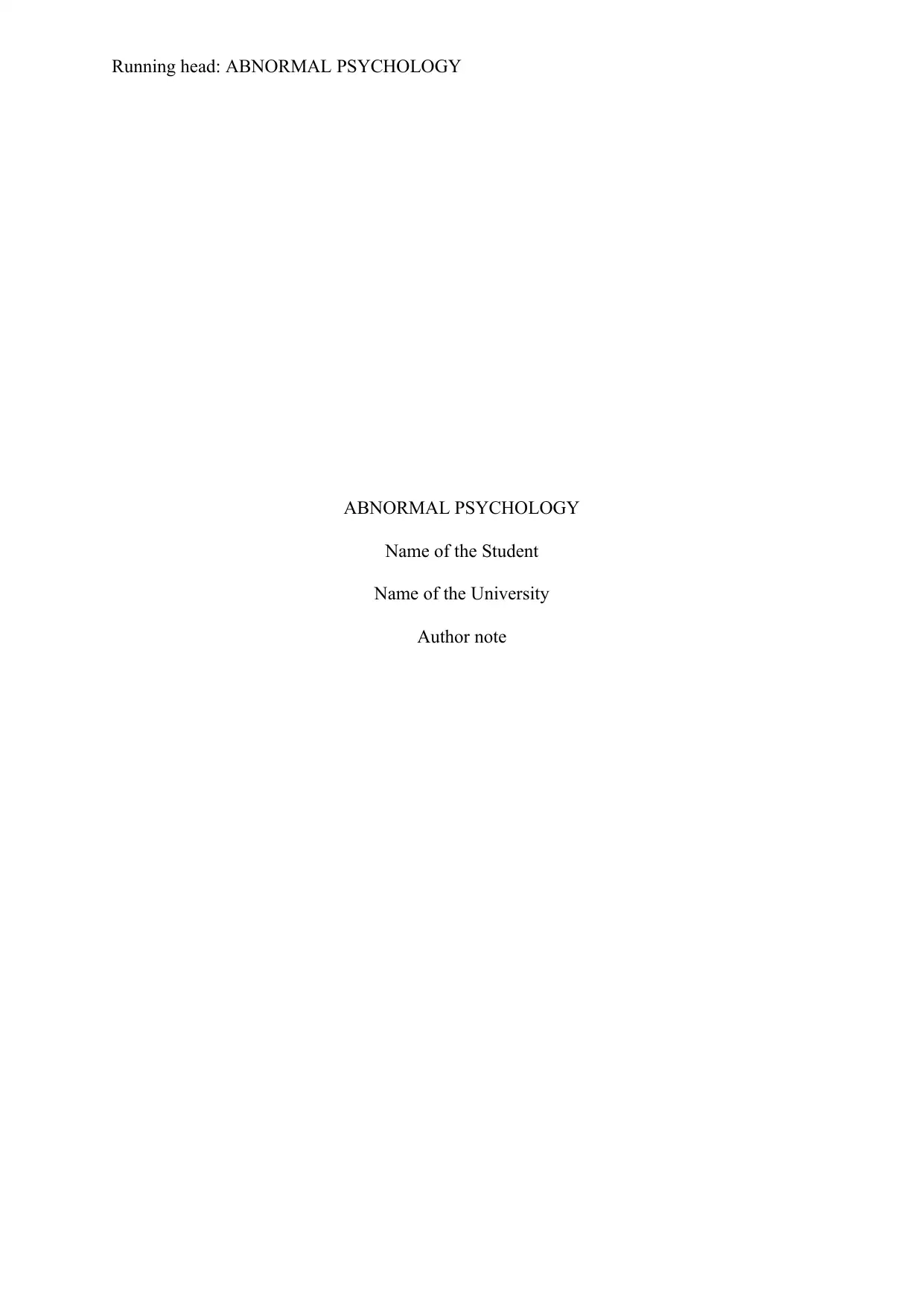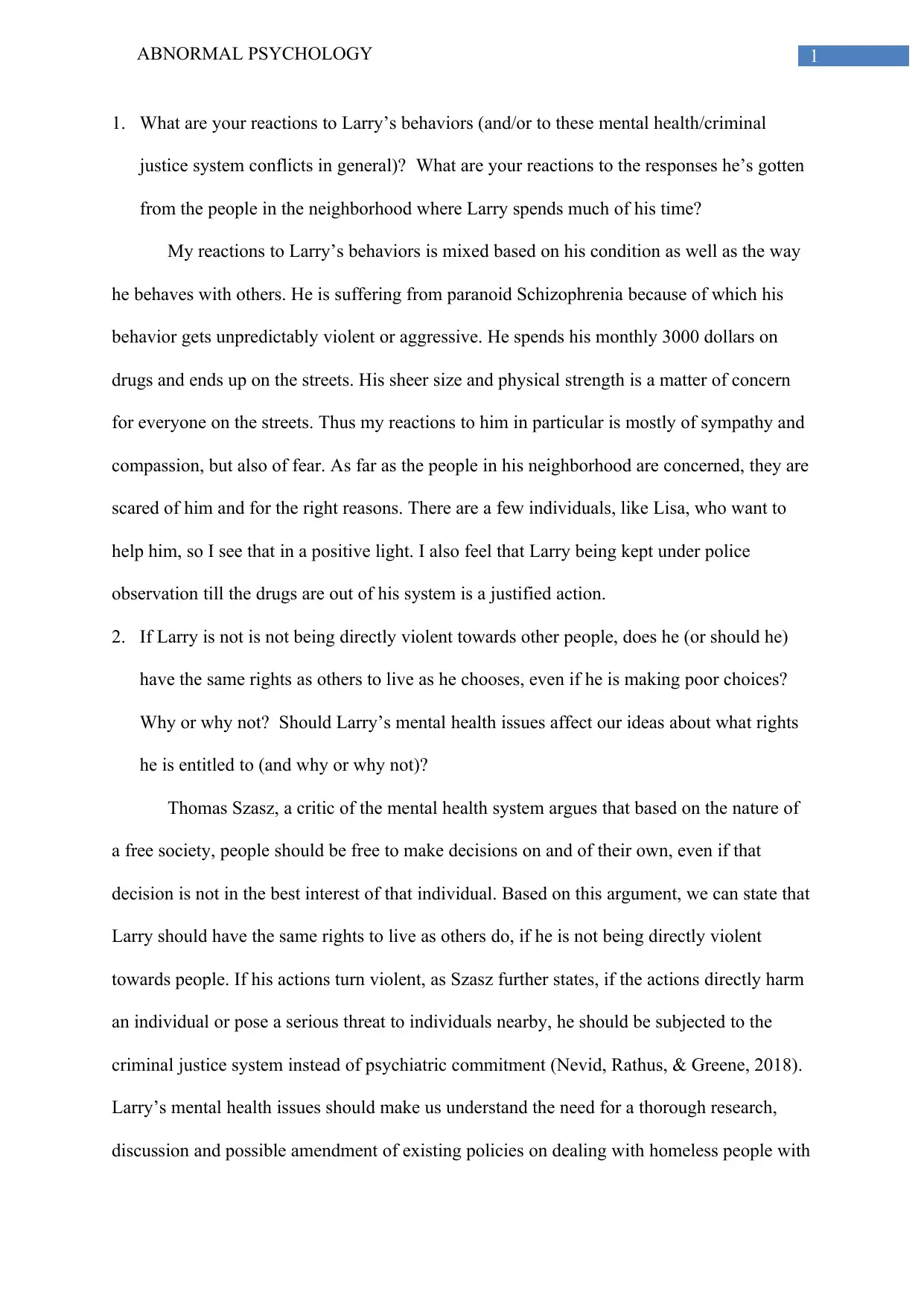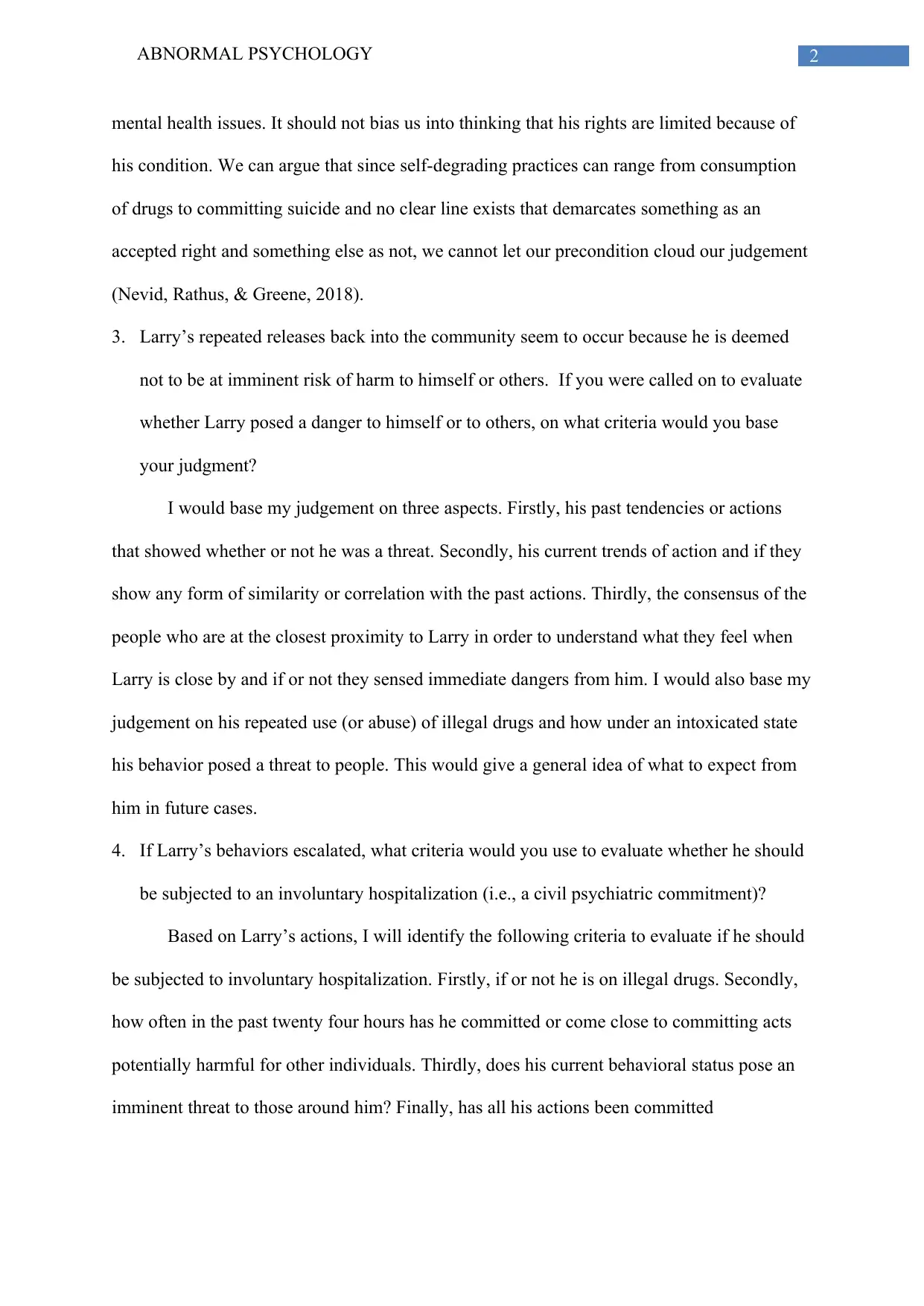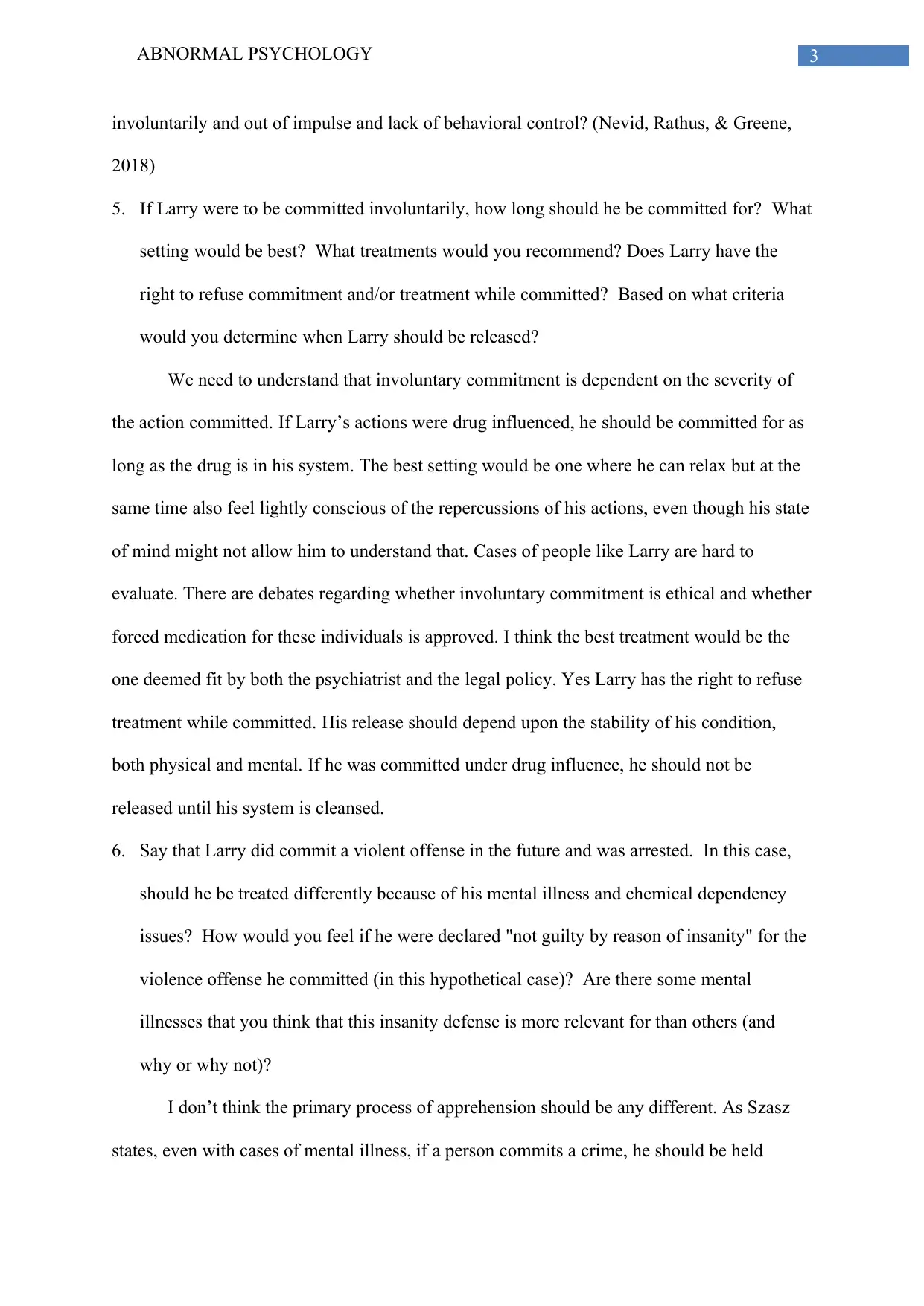Abnormal Psychology Discussion: Rights of Mentally Ill Individuals
VerifiedAdded on 2022/10/09
|6
|1366
|18
Discussion Board Post
AI Summary
This discussion assignment analyzes the case of Larry Hogue, a homeless Vietnam veteran with schizophrenia and substance abuse issues, exploring the intersections and tensions between the mental health and criminal justice systems. The student discusses their reactions to Larry's behaviors, the neighborhood's responses, and the balance between individual rights and societal needs. The assignment delves into questions of involuntary hospitalization, treatment, and the insanity defense, providing criteria for evaluating Larry's potential danger and the appropriateness of interventions. The student references Thomas Szasz's views on individual freedom and self-determination within the context of mental illness and the legal system. The document provides a comprehensive overview of the complexities surrounding mental health, legal rights, and societal responsibilities when dealing with individuals like Larry Hogue.

Running head: ABNORMAL PSYCHOLOGY
ABNORMAL PSYCHOLOGY
Name of the Student
Name of the University
Author note
ABNORMAL PSYCHOLOGY
Name of the Student
Name of the University
Author note
Paraphrase This Document
Need a fresh take? Get an instant paraphrase of this document with our AI Paraphraser

1ABNORMAL PSYCHOLOGY
1. What are your reactions to Larry’s behaviors (and/or to these mental health/criminal
justice system conflicts in general)? What are your reactions to the responses he’s gotten
from the people in the neighborhood where Larry spends much of his time?
My reactions to Larry’s behaviors is mixed based on his condition as well as the way
he behaves with others. He is suffering from paranoid Schizophrenia because of which his
behavior gets unpredictably violent or aggressive. He spends his monthly 3000 dollars on
drugs and ends up on the streets. His sheer size and physical strength is a matter of concern
for everyone on the streets. Thus my reactions to him in particular is mostly of sympathy and
compassion, but also of fear. As far as the people in his neighborhood are concerned, they are
scared of him and for the right reasons. There are a few individuals, like Lisa, who want to
help him, so I see that in a positive light. I also feel that Larry being kept under police
observation till the drugs are out of his system is a justified action.
2. If Larry is not is not being directly violent towards other people, does he (or should he)
have the same rights as others to live as he chooses, even if he is making poor choices?
Why or why not? Should Larry’s mental health issues affect our ideas about what rights
he is entitled to (and why or why not)?
Thomas Szasz, a critic of the mental health system argues that based on the nature of
a free society, people should be free to make decisions on and of their own, even if that
decision is not in the best interest of that individual. Based on this argument, we can state that
Larry should have the same rights to live as others do, if he is not being directly violent
towards people. If his actions turn violent, as Szasz further states, if the actions directly harm
an individual or pose a serious threat to individuals nearby, he should be subjected to the
criminal justice system instead of psychiatric commitment (Nevid, Rathus, & Greene, 2018).
Larry’s mental health issues should make us understand the need for a thorough research,
discussion and possible amendment of existing policies on dealing with homeless people with
1. What are your reactions to Larry’s behaviors (and/or to these mental health/criminal
justice system conflicts in general)? What are your reactions to the responses he’s gotten
from the people in the neighborhood where Larry spends much of his time?
My reactions to Larry’s behaviors is mixed based on his condition as well as the way
he behaves with others. He is suffering from paranoid Schizophrenia because of which his
behavior gets unpredictably violent or aggressive. He spends his monthly 3000 dollars on
drugs and ends up on the streets. His sheer size and physical strength is a matter of concern
for everyone on the streets. Thus my reactions to him in particular is mostly of sympathy and
compassion, but also of fear. As far as the people in his neighborhood are concerned, they are
scared of him and for the right reasons. There are a few individuals, like Lisa, who want to
help him, so I see that in a positive light. I also feel that Larry being kept under police
observation till the drugs are out of his system is a justified action.
2. If Larry is not is not being directly violent towards other people, does he (or should he)
have the same rights as others to live as he chooses, even if he is making poor choices?
Why or why not? Should Larry’s mental health issues affect our ideas about what rights
he is entitled to (and why or why not)?
Thomas Szasz, a critic of the mental health system argues that based on the nature of
a free society, people should be free to make decisions on and of their own, even if that
decision is not in the best interest of that individual. Based on this argument, we can state that
Larry should have the same rights to live as others do, if he is not being directly violent
towards people. If his actions turn violent, as Szasz further states, if the actions directly harm
an individual or pose a serious threat to individuals nearby, he should be subjected to the
criminal justice system instead of psychiatric commitment (Nevid, Rathus, & Greene, 2018).
Larry’s mental health issues should make us understand the need for a thorough research,
discussion and possible amendment of existing policies on dealing with homeless people with

2ABNORMAL PSYCHOLOGY
mental health issues. It should not bias us into thinking that his rights are limited because of
his condition. We can argue that since self-degrading practices can range from consumption
of drugs to committing suicide and no clear line exists that demarcates something as an
accepted right and something else as not, we cannot let our precondition cloud our judgement
(Nevid, Rathus, & Greene, 2018).
3. Larry’s repeated releases back into the community seem to occur because he is deemed
not to be at imminent risk of harm to himself or others. If you were called on to evaluate
whether Larry posed a danger to himself or to others, on what criteria would you base
your judgment?
I would base my judgement on three aspects. Firstly, his past tendencies or actions
that showed whether or not he was a threat. Secondly, his current trends of action and if they
show any form of similarity or correlation with the past actions. Thirdly, the consensus of the
people who are at the closest proximity to Larry in order to understand what they feel when
Larry is close by and if or not they sensed immediate dangers from him. I would also base my
judgement on his repeated use (or abuse) of illegal drugs and how under an intoxicated state
his behavior posed a threat to people. This would give a general idea of what to expect from
him in future cases.
4. If Larry’s behaviors escalated, what criteria would you use to evaluate whether he should
be subjected to an involuntary hospitalization (i.e., a civil psychiatric commitment)?
Based on Larry’s actions, I will identify the following criteria to evaluate if he should
be subjected to involuntary hospitalization. Firstly, if or not he is on illegal drugs. Secondly,
how often in the past twenty four hours has he committed or come close to committing acts
potentially harmful for other individuals. Thirdly, does his current behavioral status pose an
imminent threat to those around him? Finally, has all his actions been committed
mental health issues. It should not bias us into thinking that his rights are limited because of
his condition. We can argue that since self-degrading practices can range from consumption
of drugs to committing suicide and no clear line exists that demarcates something as an
accepted right and something else as not, we cannot let our precondition cloud our judgement
(Nevid, Rathus, & Greene, 2018).
3. Larry’s repeated releases back into the community seem to occur because he is deemed
not to be at imminent risk of harm to himself or others. If you were called on to evaluate
whether Larry posed a danger to himself or to others, on what criteria would you base
your judgment?
I would base my judgement on three aspects. Firstly, his past tendencies or actions
that showed whether or not he was a threat. Secondly, his current trends of action and if they
show any form of similarity or correlation with the past actions. Thirdly, the consensus of the
people who are at the closest proximity to Larry in order to understand what they feel when
Larry is close by and if or not they sensed immediate dangers from him. I would also base my
judgement on his repeated use (or abuse) of illegal drugs and how under an intoxicated state
his behavior posed a threat to people. This would give a general idea of what to expect from
him in future cases.
4. If Larry’s behaviors escalated, what criteria would you use to evaluate whether he should
be subjected to an involuntary hospitalization (i.e., a civil psychiatric commitment)?
Based on Larry’s actions, I will identify the following criteria to evaluate if he should
be subjected to involuntary hospitalization. Firstly, if or not he is on illegal drugs. Secondly,
how often in the past twenty four hours has he committed or come close to committing acts
potentially harmful for other individuals. Thirdly, does his current behavioral status pose an
imminent threat to those around him? Finally, has all his actions been committed
⊘ This is a preview!⊘
Do you want full access?
Subscribe today to unlock all pages.

Trusted by 1+ million students worldwide

3ABNORMAL PSYCHOLOGY
involuntarily and out of impulse and lack of behavioral control? (Nevid, Rathus, & Greene,
2018)
5. If Larry were to be committed involuntarily, how long should he be committed for? What
setting would be best? What treatments would you recommend? Does Larry have the
right to refuse commitment and/or treatment while committed? Based on what criteria
would you determine when Larry should be released?
We need to understand that involuntary commitment is dependent on the severity of
the action committed. If Larry’s actions were drug influenced, he should be committed for as
long as the drug is in his system. The best setting would be one where he can relax but at the
same time also feel lightly conscious of the repercussions of his actions, even though his state
of mind might not allow him to understand that. Cases of people like Larry are hard to
evaluate. There are debates regarding whether involuntary commitment is ethical and whether
forced medication for these individuals is approved. I think the best treatment would be the
one deemed fit by both the psychiatrist and the legal policy. Yes Larry has the right to refuse
treatment while committed. His release should depend upon the stability of his condition,
both physical and mental. If he was committed under drug influence, he should not be
released until his system is cleansed.
6. Say that Larry did commit a violent offense in the future and was arrested. In this case,
should he be treated differently because of his mental illness and chemical dependency
issues? How would you feel if he were declared "not guilty by reason of insanity" for the
violence offense he committed (in this hypothetical case)? Are there some mental
illnesses that you think that this insanity defense is more relevant for than others (and
why or why not)?
I don’t think the primary process of apprehension should be any different. As Szasz
states, even with cases of mental illness, if a person commits a crime, he should be held
involuntarily and out of impulse and lack of behavioral control? (Nevid, Rathus, & Greene,
2018)
5. If Larry were to be committed involuntarily, how long should he be committed for? What
setting would be best? What treatments would you recommend? Does Larry have the
right to refuse commitment and/or treatment while committed? Based on what criteria
would you determine when Larry should be released?
We need to understand that involuntary commitment is dependent on the severity of
the action committed. If Larry’s actions were drug influenced, he should be committed for as
long as the drug is in his system. The best setting would be one where he can relax but at the
same time also feel lightly conscious of the repercussions of his actions, even though his state
of mind might not allow him to understand that. Cases of people like Larry are hard to
evaluate. There are debates regarding whether involuntary commitment is ethical and whether
forced medication for these individuals is approved. I think the best treatment would be the
one deemed fit by both the psychiatrist and the legal policy. Yes Larry has the right to refuse
treatment while committed. His release should depend upon the stability of his condition,
both physical and mental. If he was committed under drug influence, he should not be
released until his system is cleansed.
6. Say that Larry did commit a violent offense in the future and was arrested. In this case,
should he be treated differently because of his mental illness and chemical dependency
issues? How would you feel if he were declared "not guilty by reason of insanity" for the
violence offense he committed (in this hypothetical case)? Are there some mental
illnesses that you think that this insanity defense is more relevant for than others (and
why or why not)?
I don’t think the primary process of apprehension should be any different. As Szasz
states, even with cases of mental illness, if a person commits a crime, he should be held
Paraphrase This Document
Need a fresh take? Get an instant paraphrase of this document with our AI Paraphraser

4ABNORMAL PSYCHOLOGY
answerable to the criminal justice system which is the same for all (Nevid, Rathus, & Greene,
2018). I feel that if he was declared not guilty, it would display a severe drawback in the
justice system because he would go back, repeat his actions and hurt more people in the
process. People like Larry who have no active control over their conscious actions, can
understandably, not be held responsible but the justice system should account for that gap by
establishing an enabling environment where both the parties can be kept safe.
answerable to the criminal justice system which is the same for all (Nevid, Rathus, & Greene,
2018). I feel that if he was declared not guilty, it would display a severe drawback in the
justice system because he would go back, repeat his actions and hurt more people in the
process. People like Larry who have no active control over their conscious actions, can
understandably, not be held responsible but the justice system should account for that gap by
establishing an enabling environment where both the parties can be kept safe.

5ABNORMAL PSYCHOLOGY
References
Nevid, J. S., Rathus, S. A., & Greene, B., (2018). Abnormal Psychology and the Law.
Abnormal psychology in a changing world. Upper Saddle River: Prentice Hall,. pp
561-581. [VitalSource Bookshelf].
References
Nevid, J. S., Rathus, S. A., & Greene, B., (2018). Abnormal Psychology and the Law.
Abnormal psychology in a changing world. Upper Saddle River: Prentice Hall,. pp
561-581. [VitalSource Bookshelf].
⊘ This is a preview!⊘
Do you want full access?
Subscribe today to unlock all pages.

Trusted by 1+ million students worldwide
1 out of 6
Related Documents
Your All-in-One AI-Powered Toolkit for Academic Success.
+13062052269
info@desklib.com
Available 24*7 on WhatsApp / Email
![[object Object]](/_next/static/media/star-bottom.7253800d.svg)
Unlock your academic potential
Copyright © 2020–2026 A2Z Services. All Rights Reserved. Developed and managed by ZUCOL.



